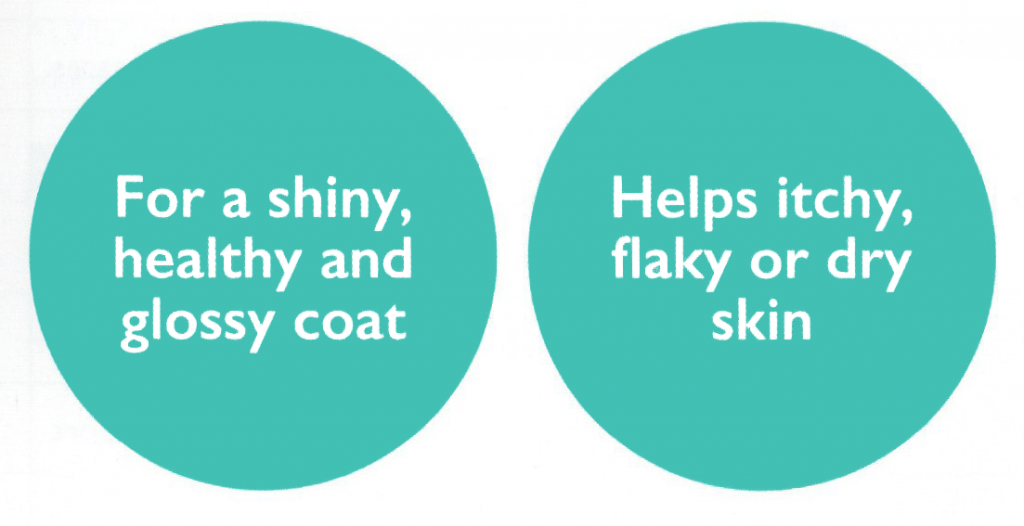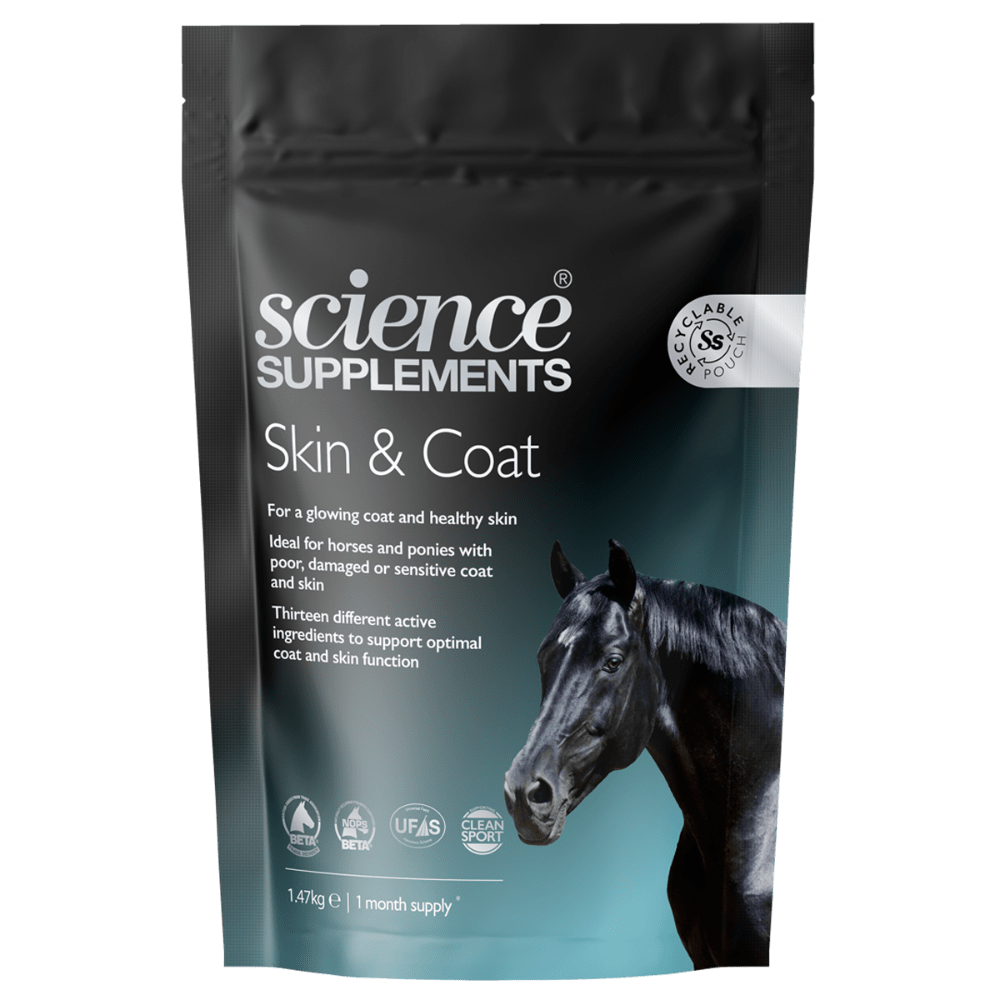Skin & Coat 1.47kg
£44.99 — available on subscription
- For a glowing coat and healthy skin
- Ideal for horses and ponies with poor, damaged or sensitive coat and skin
- Thirteen different active ingredients to support optimal coat and skin function
Collection from Katesbridge, Co Down BT32 5NH is available.
Please contact us by phone: 028 4067 9912 or 07743601777
or email to arrange: info@svsequine.co.uk
Key Points
- One of the highest specification skin & coat supplements on the market
- Formulated by veterinary nutrition specialists and nutritional scientists
- Contains marine source Omega 3
We all like to see our horses with a shiny coat and healthy skin, but the coat and skin is not just aesthetic. The skin is the largest organ in the body and is not only responsible for control of body temperature and production of Vitamin D from sunlight but it must also protect the horse from environmental factors. These include sunlight, insects, bacteria, moulds, fungi and atmospheric pollutants such as ozone, nitrogen and sulphur dioxides.
Frequent washing also increases the risk of flaking and skin infections. It is therefore no surprise that poor skin condition can make horses lose condition and fail to thrive.

Skin & Coat contains 13 different essential nutrients to support healthy coat and skin, including Omega 3 fatty acids which promote both a shiny coat and healthy skin and have been shown in scientific studies to help animals with insect bite sensitivity. Other essential ingredients for healthy coat and skin include zinc which can increase hair growth, MSM as a source of sulphur which in turn is a building block for the protein keratin, a central component of both hair and skin and also biotin which has also been shown to stimulate keratin production by skin cells.
Finally, Skin & Coat contains high levels of antioxidant Vitamins C and E which have been shown to be reduced in a range of skin conditions.
Instructions for use and feeding guide Level 25ml (16.3g) scoops per day
This product should be fed for at least 30 days. Split between meals where possible.
Pony – approximately 250kg 2
Horse – approximately 500kg 3
Large Horse – over 750kg 4
Do not exceed the recommended intake.
One of our core values is transparency. That’s why we list all the active ingredients per daily feeding rate so you know exactly what your horse is getting.
Active Ingredients:
Per daily horse dose (75ml = 3 x 25ml scoops; 49g) provides: Vitamin E (natural) 1500IU; Selenium (organic) 2mg; Biotin 30mg; Omega 3 fatty acids (marine) 5g; MSM 5g; Vitamin C (as L-ascorbyl mono-phosphate – bioavailable to horses) 5g; L-Arginine 1g; Methionine 5g; Vitamin A 20,000IU; Vitamin K 20mg; Vitamin B6 20mg; Copper (chelate) 100mg; Zinc (chelate) 300mg; micronised linseed 10g.
Composition:
Micronised linseed, methionine, methyl sulfonyl methane, ascorbyl mono-phosphate (Vitamin C), marine source of omega 3, rice flour, L-Arginine, Vitamin A, Vitamin E, chelated zinc, chelated copper, biotin, Vitamin K, Vitamin B6, organic selenium (from yeast).
Analytical Constituents:
Protein 6%; Fibre 1%; Oils & Fats 1.5%; Ash 2%; Moisture <3%; Sodium <1%; Calcium <1%; Phosphorous <1%.
Additives (per kg):
Vitamin A (3a672a) retinyl acetate (408 KIU/kg); Vitamin E (3a700) all-rac-alpha-tocopheryl acetate (31 KIU/kg); Copper (E4) from cupric chelate amino acid hydrate (2.0 g/kg); Zinc chelate (3b612) of protein hydrolysates (6.1 g/kg); DL Methionine (3c301) (102 g/kg); L-arginine (3c3.6.1) (20.4 g/kg); Vitamin B6 (3a831)(0.41 g/kg); Selenised inactivated yeast (3b8.10)(17.8g/kg, equivalent to 41mg elemental Se per kg); L-ascorbyl mono-phosphate (3a312)(341g/kg); Biotin (3a880)(0.61 g/kg). Selenium (E8) 19 mg/kg.
The Active Ingredients
Methionine
Methionine is one of nine essential amino acids which must be obtained from the diet and cannot be made by the horse. Methionine is one of four amino acids that contains sulphur. Hair is composed mainly of a protein called Keratin which is high in cysteine and methionine. Cysteine is a conditional amino acid which means it is not essential except when the horse is ill or under stress. It is not necessary to feed cysteine as it made from methionine in the liver. Methionine is also essential for production of collagen, which is a major structural component of skin. Signs of methionine deficiency can include skin lesions and hair loss.
Methyl sulfonyl methane (MSM)
MSM is used in many applications for its anti-inflammatory properties. It is also a rich source of sulphur. In people in a placebo-controlled study, oral MSM has been shown to improve skin firmness and texture and to improve elasticity.
Vitamin C (as Ascorbyl Mono-phosphate)
Vitamin C plays an important role in maintaining skin health. It promotes the differentiation of keratinocytes (cells which make up 90% of the outer layer of the skin). Normal, healthy skin needs high concentrations of Vitamin C to ensure an intact skin barrier, protect against UV damage and limit inflammation. Vitamin C deficiency can lead to poor skin condition and may cause or aggravate conditions such as atopic dermatitis and Sweet Itch. Horses can make their own Vitamin C, unlike people, but due to diet, exercise, age or illness many horses have low levels of Vitamin C in their blood. Horse absorb pure ascorbic acid poorly compared with ascorbyl mono-phosphate, which is more effective at raising blood levels.
Omega 3 (Marine Source)
Several studies in horses have demonstrated the beneficial effects of omega 3 supplementation on skin health in horses. Marine omega 3 sources have been shown to enhance the immune response. Oils in general result in a glossier coat appearance.
L-Arginine
L-arginine is another conditionally essential amino acid (like methionine). Arginine is involved in the control of blood flow and blood pressure as well as being an important neurotransmitter. In culture, exposure of skin fibroblasts (cells responsible for making collagen and repairing damaged skin) to arginine encourages them to divide and enhances immune defence which is suggested to be important in repair and wound healing. Arginine supplementation has also been shown to increase protein production in wound healing following burns.
Vitamin A
Vitamin A is not a single compound but a group comprising retinol, retinaldehyde, retinoic acid, and provitamin A carotenoids, including beta-carotene, alpha-carotene, gamma-carotene and cryptoxanthin. Vitamin A deficiency leads to an abnormal thickening of the skin known as hyperkeratosis in which the skin has abnormally high levels of keratin.
Vitamin E
Vitamin E is the primary antioxidant present in skin. Vitamin E cannot be made by horses and must be obtained from the diet. Vitamin E turnover (usage) is increased in older horses, horses that are stressed and in horses that are ill. Vitamin E depletion in the skin may be induced by UVB rays or by free radicals produced by UVA rays. Vitamin E may also prevent signs of aging in skin.
Chelated Zinc
Zinc is an essential mineral required for metabolism, immune function and wound healing. It is particularly high in legumes such as alfalfa, clover, peas, chickpeas, and soybeans. The body does not store excess zinc so it must be obtained from the diet on regular basis. Zinc deficiency can result in slow wound healing, hair loss and rough and/or dry skin. A study in horses showed that feeding organic zinc (chelate) increased hair elasticity and strength.
Chelated Copper
Copper is an essential mineral that is involved with the function of antioxidant enzymes. A study in horses showed that feeding organic copper (chelate) increased hair elasticity and strength. Copper is involved with keratin (hair protein) synthesis. Copper deficiency in horses leads to changes in hair colour. This is because hair pigments are derived from tyrosine by the enzyme tyrosinase which is copper dependent. Forages are often low in copper.
Biotin
Biotin is an essential B Vitamin and technically referred to as Vitamin B7. Biotin must be obtained from the diet (e.g. alfalfa, oats, barley, soybean meal) or absorbed from the intestinal tract. High levels of biotin are present in hoof horn but also in hair.
Vitamin K
Vitamin K is a fat soluble vitamin and is found in high amounts in green vegetables and dark coloured berries. It is best known for its role in blood clotting but Vitamin K plays an important role in the production and maintenance of skin.
Vitamin B6
Vitamin B6 is an important nutrient that serves as a cofactor for at least 110 different enzymes. Vitamin B6 is an important factor for the growth and repair of skin. Vitamin B6 deficiency leads to suppression of collagen synthesis and dermatitis (inflamed skin).
Organic Selenium (from yeast)
Selenium is an important component of the antioxidant enzyme glutathione peroxidase which works in conjunction with non-enzymatic antioxidants such as Vitamin E and Vitamin C to protect cell membranes from oxidants.
In mice, selenium supplementation has been shown to reduce lesions in an atopic dermatitis-like conditions.
In people, selenium deficiency is associated with development of a variety of skin abnormalities, including psoriasis.
Micronised Linseed
Omega 3 oils from linseed have been shown in horses with ‘Sweet Itch’ to alter the fatty acid profile of the hair and reduce inflammation. In addition, oil in the diet results in a glossier coat appearance.
Reviews
Only logged in customers who have purchased this product may leave a review.











There are no reviews yet.